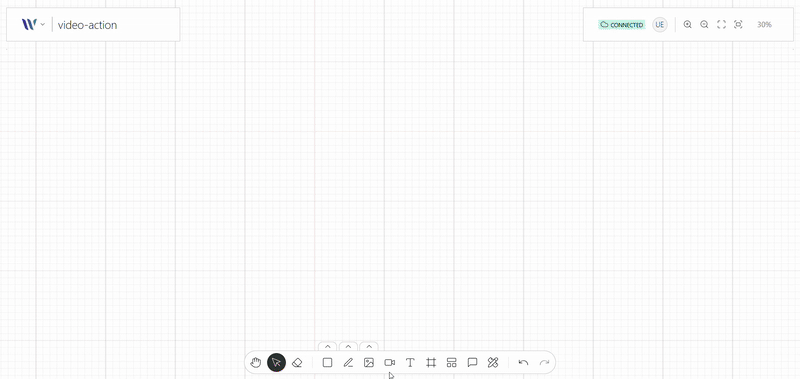Video Tool
Add a video to the canvas

Introduction
This action allows users to add videos to the canvas by selecting a video file, we support the following formats:
- Container Formats:
.mp4,.mov,.m4v - Video Codecs:
H.264(MPEG-4 AVC),HEVC(H.265) - Audio Codecs:
AAC
Once added, a node is added showcasing that the node is a video. When adding a video you need to provide:
- an URL for the video
- an URL for an image placeholder, with is an still to showcase the content of the video.
Once play is triggered the placeholder ir replaced by the real video, also on hover a progress bar is shown.
Dependencies
This action needs also registered on the Weave instance the following:
- Video node
Usage
Import the Action
Start by importing the action:
import { WeaveVideoToolAction } from "@inditextech/weave-sdk";Register the Action
Then register the action on the Weave class instance.
const instance = new Weave({
...
actions: [
...,
new WeaveVideoToolAction(),
]
})Setup the action trigger
Setup on a button or any element on the UI the user can interact with on the action event:
const { finishUploadCallback } = instance.triggerAction("videoTool");On your end upload a video to your backend, probably on the backend extract a frame as placeholder.
Once you have an URL for the video and the placeholder, call the finishUploadCallback, passing as parameter
the both URLs.
For example on a button on React:
import React from "react";
import { useWeave } from "@inditextech/weave-react";
const MyVideoToolTriggerComponent = () => {
const inputFileRef = React.useRef<any>(null);
const instance = useWeave((state) => state.instance);
const [showSelectFile, setShowSelectFile] = React.useState<boolean>(false);
React.useEffect(() => {
if (showSelectFile && inputFileRef.current) {
inputFileRef.current.click();
setShowSelectFile(false);
}
}, [instance, showSelectFile, setShowSelectFile]);
const handleUploadFile = React.useCallback(
async (file) => {
// Upload file to you storage / this is dummy, just an example
const { videoURL, videoPlaceholderURL, videoInfo } = await uploadImage(
file
);
const { finishUploadCallback } = instance.triggerAction("videoTool", {
videoId: videoInfo.id,
width: videoInfo.width,
height: videoInfo.height,
});
finishUploadCallback({
url: videoURL,
placeholderUrl: placeholderUrl,
});
},
[instance]
);
return (
<>
<input
type="file"
accept="video/mp4,video/quicktime"
name="video"
style={{ display: "none" }}
ref={inputFileRef}
onClick={() => {
inputFileRef.current.value = null;
}}
onChange={(e) => {
const file = e.target.files?.[0];
if (file) {
handleUploadFile(file);
}
}}
/>
<button
onClick={() => {
setShowSelectFile(true);
}}
>
Image Tool
</button>
</>
);
};Trigger the action
Finally a final user trigger the UI element that launches the action.
When active the user:
- Select the video to upload.
- Video is uploaded with the API the developer choses or has available.
- Once the video is uploaded, the user can click or touch on the canvas to place it.
Then the video is added to the canvas as a fully functional node—ready. This action integrates seamlessly with Weave.js's real-time state system, ensuring the new element appears instantly for all connected users.
